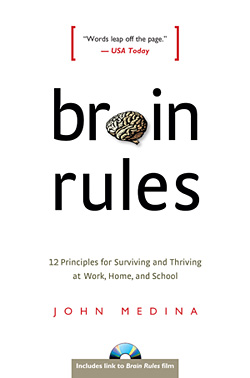 I’m working on expanding my list of books on the left to include some of the resources I haven’t yet reviewed on the site, and going forward I’ll be posting reviews of books I’ve read recently or some time ago, eventually linking to the reviews from the book list on the left. (The book reviews are in addition to my regular Monday, Wednesday, and Friday articles.)
I’m working on expanding my list of books on the left to include some of the resources I haven’t yet reviewed on the site, and going forward I’ll be posting reviews of books I’ve read recently or some time ago, eventually linking to the reviews from the book list on the left. (The book reviews are in addition to my regular Monday, Wednesday, and Friday articles.)
John Medina’s book Brain Rules: 12 Principles for Surviving and Thriving at Work, Home, and School is a fascinating read both for its content and because it is written about how we think and learn, so that it uses some of its own strategies to become more effective. For instance, Medina talks about how much more powerfully highly emotional situations imprint on our memories, and he uses several emotionally-charged situations in the book to illustrate his principles, helping make them more likely to sink in. As another example, he talks about the profound improvement we experience in learning when visuals are added to spoken or written words, and he helpfully supplies a very visual Web site, www.brainrules.net, to help underscore the points in his book.
Medina is a developmental molecular biologist who knows his stuff in great detail and isn’t shy about bringing in practical research from all quarters, which makes a much stronger case for the information he presents.
Several of his brain rules are extremely meaningful to our daily lives: the sections on exercise, short-term memory, sleep, and vision struck me particularly. Some of his other brain rules seem to be less profound and less useful, although there is some useful material in each of the twelve chapters.
Toward the end of each chapter, Medina offers ideas on how the information could be put into use. Unfortunately, he offers this information as a scientist does, coming up with hypotheses about what might work in classrooms or workplaces and suggesting that people try these things on a large scale to see how they work. That’s great, but it’s not much use to us in the trenches who are trying to find better ways to teach children or accomplish work or cooperate. I would rather he had focused on things that had already been tried and documented and pointed out where there were practices that could be adopted for definite gains. At least, though, there’s a chance that his suggestions for experiments will inspire other scientists to tackle those experiments, and if we’re lucky, Medina will follow up with another book.


